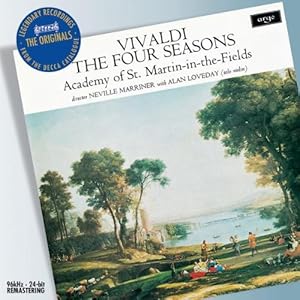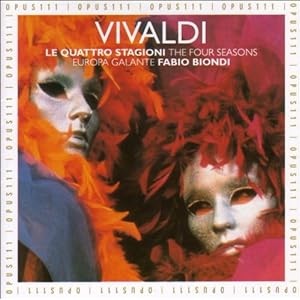I actually saw a TV concert of him performing that many, many years ago!!Ciaran wrote:James Galway did one (on the flute obviously):Jared wrote:^^ it would certainly be interesting to learn how many releases T4S have had, using less conveniuonal instruments... I mean to say, it says something about the enduring popularity of these pieces, that a record company thinks there is a sufficient market out there for a version played on kettledrums or Simon's organ...
I hope never to hear it!
Vivaldi: Four Seasons
Re: Vivaldi: Four Seasons
To be is to do: Socrates
To do is to be: Sartre
Do be do be do: Sinatra
To do is to be: Sartre
Do be do be do: Sinatra
Re: Vivaldi: Four Seasons
I thought that I would stick this post here as well just for relevance....

I was listening to this CD tonight and I thought that it was interesting that the slow movement of the Concerto in D major RV94 was very reminiscent of the slow movement of Winter from the Four Seasons. I have checked the chronology of these two works and it seems that RV 94 was composed in 1716 and The Four Seasons was composed in 1725 so Vivaldi obviously reworked the theme from the earlier work into “Winter” as was the custom of the time. The main solo theme is very similar but the accompaniment is different as RV94 has a violin constantly bowing as opposed to playing pizzicato; the work was obviously adapted to suit the new context. I know it is nerdy but I find it fascinating....and it is relevant at the moment, sort of....

I was listening to this CD tonight and I thought that it was interesting that the slow movement of the Concerto in D major RV94 was very reminiscent of the slow movement of Winter from the Four Seasons. I have checked the chronology of these two works and it seems that RV 94 was composed in 1716 and The Four Seasons was composed in 1725 so Vivaldi obviously reworked the theme from the earlier work into “Winter” as was the custom of the time. The main solo theme is very similar but the accompaniment is different as RV94 has a violin constantly bowing as opposed to playing pizzicato; the work was obviously adapted to suit the new context. I know it is nerdy but I find it fascinating....and it is relevant at the moment, sort of....
To be is to do: Socrates
To do is to be: Sartre
Do be do be do: Sinatra
To do is to be: Sartre
Do be do be do: Sinatra
Re: Vivaldi: Four Seasons
^^ Fergus, I remember reading somewhere that 3 of the seasons were original works at the time of writing in 1725, and themes from one of the seasons had been borrowed from one of his earlier concertos.. maybe that is the one.
Re: Vivaldi: Four Seasons

This one has been referred to earlier by Ciaran and I have it as part of this box set....

When I first started listening to Classical Music I bought a set of cassette tapes of Vivaldi’s music featuring the Academy of St. Martin in the Fields conducted by Neville Marriner. That was an inspirational set for me as the music was played with a very light touch and with great musicality. And so it is here; The textures of the music are light and both the orchestra and the soloist play very well. A number of decades later and with a lot more critical listening behind me I find that the speeds are on the slow sides for my current taste. However, that does not take away from some very nice performances. The sound of the orchestra is full and warm and this also lends weight to the sound especially in the storm scenes. It is not a modern period performance but a nice one nonetheless and will be appreciated by a wide audience.
To be is to do: Socrates
To do is to be: Sartre
Do be do be do: Sinatra
To do is to be: Sartre
Do be do be do: Sinatra
Re: Vivaldi: Four Seasons

This version is on vinyl and it is an interesting sample of what can sometimes be referred to as “Big Band” or “Old Style” music making. A full sized (string) orchestra is used so the sound has ample weight but the texture does not suffer as the music is not thick or muddy in any way. The one big issue that I have with this recording (and many recordings of the Baroque and Classical eras of that time) is that of the slow speeds. To me, Vivaldi was meant to be played vivaciously and with real gusto. The Four Seasons are well played here but those two adjectives do not describe the flow of the music unfortunately; it is painfully slow in places and as a result the storms and dances are rather limp affairs altogether. That was the taste of the time I suppose. There is absolutely nothing wrong with this version but I find it difficult to adjust to the slower, “stately” tempi of this style after years of listening to HIP performances. It is an interesting listen for comparison purposes.
To be is to do: Socrates
To do is to be: Sartre
Do be do be do: Sinatra
To do is to be: Sartre
Do be do be do: Sinatra
Re: Vivaldi: Four Seasons

This is a beautiful, stylish version (recorded in 1991) that simply sounds gorgeous. It is also full of drama and excitement. Anyone that already knows these forces will know what to expect and suffice to say that the playing from all concerned is impeccable. Biondi’s playing is magnificent. He plays fiendishly in places; I am sure that Vivaldi would certainly approve of his performances and he is also very ably accompanied by Europa Galante. The speeds are brisk and lively but the music is infused with such fluidity that one hardly notices. The textures are rich but never dense. This highly charged version gets a very high recommendation!
To be is to do: Socrates
To do is to be: Sartre
Do be do be do: Sinatra
To do is to be: Sartre
Do be do be do: Sinatra
Re: Vivaldi: Four Seasons
^^ I actually saw that version in a charity shop recently Fergus... assumed it would be very good, because of the Opus 111 reputation, but left it for someone else.. I think there's only so many versions you need.
Re: Vivaldi: Four Seasons
I must say my friend that was one of the very few mistakes that you have made.Jared wrote:^^ I actually saw that version in a charity shop recently Fergus... assumed it would be very good, because of the Opus 111 reputation, but left it for someone else.. I think there's only so many versions you need.
To be is to do: Socrates
To do is to be: Sartre
Do be do be do: Sinatra
To do is to be: Sartre
Do be do be do: Sinatra
Re: Vivaldi: Four Seasons

This second version from Biondi (recorded in 2000) is obviously taken from the full Opus 8 “Il cimento dell’armonica e dell’inventione”. All that has been said of the previous version in terms of quality still holds true here. However, I feel that this is a more “sophisticated” or “polished” version that is not imbued with the impetuosity of youth as the previous version was. It is no less fine a performance for that, quite the contrary; it is just a different approach, perhaps a more “considered” approach following ten years or so of live performances, who knows? It is very interesting to compare and contrast these two versions.
Once again the playing from all concerned is magnificent and the production and recording are also both gorgeous. If you like your Vivaldi to be crisp, sharp, fast and with plenty of excitement and body then this is definitely for you. It certainly comes very well recommended and it also has the added obvious advantage of consisting of the full Opus 8.
To be is to do: Socrates
To do is to be: Sartre
Do be do be do: Sinatra
To do is to be: Sartre
Do be do be do: Sinatra
-
bombasticDarren
- Posts: 1370
- Joined: Sun Jul 11, 2010 3:04 pm
Re: Vivaldi: Four Seasons
Agreed.fergus wrote:I must say my friend that was one of the very few mistakes that you have made.Jared wrote:^^ I actually saw that version in a charity shop recently Fergus... assumed it would be very good, because of the Opus 111 reputation, but left it for someone else.. I think there's only so many versions you need.
(says the man who walked away from the Tallis disc yesterday...)
